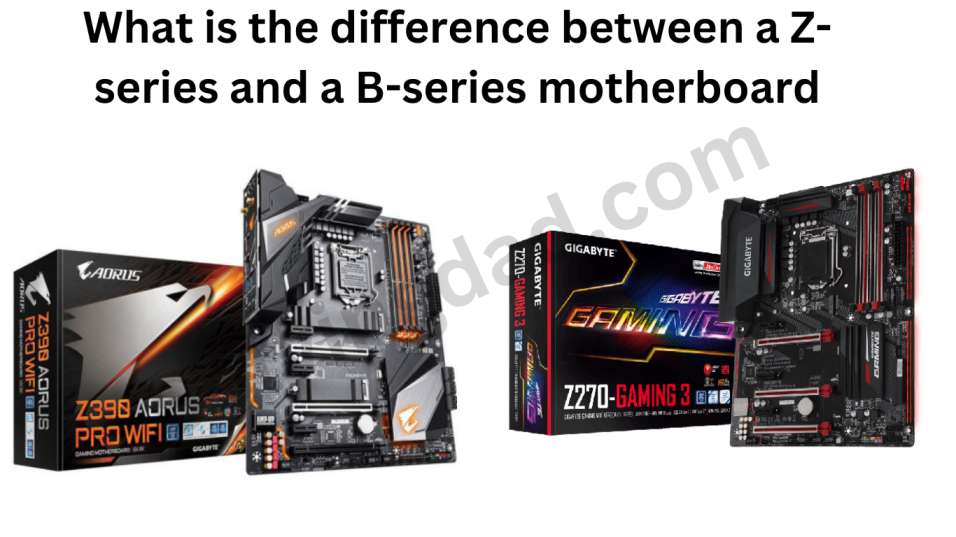The difference between a Z-series and B-series motherboard: If you’re planning to build a new PC, one of the most important components you’ll need to choose is the motherboard. Motherboards come in a variety of different models, and two of the most common types are Z-series and B-series motherboards. But what is the difference between these two types of motherboards, and which one is right for you? Let’s take a closer look.
Z-series Motherboards
Z-series motherboards are typically designed for high-end performance and overclocking. They are usually more expensive than B-series motherboards and offer a range of advanced features. Some of the key features of Z-series motherboards include:
- Advanced Overclocking Capabilities: Z-series motherboards are designed to offer advanced overclocking capabilities, which allow you to push your CPU and other components to higher speeds than their default settings.
- Higher RAM Speeds: Z-series motherboards support higher RAM speeds than B-series motherboards, which can improve overall system performance.
- Multiple PCIe Lanes: Z-series motherboards have more PCIe lanes than B-series motherboards, which allow you to add more expansion cards like graphics cards, sound cards, or NVMe storage devices.
- Better Power Delivery: Z-series motherboards often have better power delivery systems that can provide more stable power to the CPU and other components when overclocking.
B-series Motherboards
B-series motherboards are designed for mid-range performance and are generally more affordable than Z-series motherboards. While they may not offer as many features as Z-series motherboards, they still provide strong performance and are a great option for budget-conscious users. Some of the key features of B-series motherboards include:
- Budget-Friendly: B-series motherboards are generally more affordable than Z-series motherboards, making them a great choice for users who want to build a powerful system without breaking the bank.
- Solid Performance: While they may not offer the same level of performance as Z-series motherboards, B-series motherboards still offer solid performance and can handle most tasks with ease.
- Adequate RAM Support: B-series motherboards typically support lower RAM speeds than Z-series motherboards, but they can still support up to 64GB or more of RAM, which is more than enough for most users.
- Limited PCIe Lanes: B-series motherboards have fewer PCIe lanes than Z-series motherboards, which means you’ll have fewer expansion card options.
Which One Is Right For You?
The choice between a Z-series and B-series motherboard ultimately comes down to your specific needs and budget. If you’re looking to build a high-end system with advanced features and overclocking capabilities, a Z-series motherboard is the way to go. However, if you’re looking for a more budget-friendly option that still offers solid performance, a B-series motherboard may be a better fit.
Conclusion
In conclusion, the difference between Z-series and B-series motherboards comes down to their intended use and level of performance. Z-series motherboards are designed for high-end performance and overclocking, with advanced features such as higher RAM speeds, multiple PCIe lanes, and better power delivery systems. B-series motherboards, on the other hand, are more budget-friendly and designed for mid-range performance, offering solid performance and adequate RAM support but with fewer PCIe lanes and fewer advanced features.
FAQ
What are some other types of motherboards available for Intel processors?
Some other types of motherboards include H-series (which are similar to B-series but may offer additional features like Wi-Fi), X-series (which are high-end enthusiast motherboards with even more advanced features than Z-series), and Q-series (which are designed for business use).
Can I use a Z-series motherboard with an AMD processor?
No, Z-series motherboards are designed specifically for Intel processors and use a different socket than AMD processors. AMD processors require motherboards with an AM4 socket.
Are Z-series motherboards worth the extra cost?
It depends on your needs and priorities. If you’re a power user who wants to maximize your computer’s performance and capabilities, a Z-series motherboard may be worth the investment. However, if you’re a more casual user who doesn’t need all the advanced features, a B-series (or even an H-series) motherboard may be a more cost-effective option.
Do B-series motherboards support overclocking?
Yes, most B-series motherboards do offer some level of overclocking support. However, the level of support and the extent to which you can overclock may be more limited compared to a Z-series motherboard.
Can I use multiple GPUs with a B-series motherboard?
Generally, no. B-series motherboards typically only support a single GPU, while Z-series motherboards may offer support for multiple GPUs.
